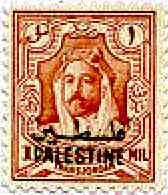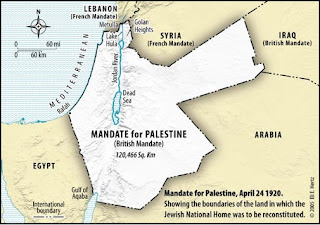The anti-Israel crowd likes to insist that Israel can’t be “home” for a Jew, because the Jews were gone for thousands of years. The Arabs, they say, have a more recent claim. But what about the Arabs who live in Jordan, comprised of 80 percent of the British Mandate for Palestine? How can they “return” to “Palestine” when they are already IN Palestine—Mandate Palestine. Aren't they already home?
The Right of Return in the eyes of the world applies only to Arabs, never to Jews. The "key of return" has come to symbolize the hope of Arabs to boot out the current residents of homes their ancestors fled in 1948. Why is it not equally valid for Jews, with their own symbol of hope, the mizrach sign that points to Jerusalem and denotes the direction of prayer, to return to the Jewish homeland? Does it matter where they lived after expulsion? What is the expiration date on reclaiming a home and who gets to determine this date?
 |
| An Arab woman holds a symbolic "Key of Return" |
.jpg) |
| Framed mizrach with the word מזרח on the wall (Jan Voerman, De treurdagen 'the sorrowful days', c. 1884) |
A more basic question might be: Where is home? Is it the place where your grandparents lived or the city of your birth? Because if you tell me that I should go back to Pittsburgh because I was born there, isn't it the same for those who were born in Amman, Lebanon, Syria, and the many other countries to which Arabs fled in 1948? They had children and grandchildren born in these countries. And of course, those who fled to Jordan never really left. They just moved to a different part of "Palestine."
As did those who fled to Syria.
Veteran (now dead) White House Correspondent Helen Thomas once suggested that “Jews Get the Hell out of ‘Palestine’” and “go home” to Poland and Germany. Thomas covered the White House through ten presidential administrations, from Kennedy to Obama. But telling Jews to go back to Poland and Germany, as it turns out, was considered beyond the pale. Because everyone knew that it was in Germany and Poland that Jews, not so long ago, had been systematically gassed and burned in the millions. Thomas, in essence, wasn't sending Jews home, but to their deaths.
Even those who agreed with Thomas' sentiment probably would have
wished her more circumspect. Thomas had allowed the veneer of the professional journalist to slip, revealing her hate. The optics were not good. As a result, Thomas was
forced to retire in disgrace, a victim of her own loose lips. At 89, she was
still in full possession of her mental faculties, the verbal fart
notwithstanding. She knew exactly what she was saying. She just hadn’t known
she would not get away with it.
I remember Thomas often, though not with fondness. She comes to mind when I respond to comments on Twitter or Quora suggesting I have forfeited the right of return. Not
long ago, for example, when I spoke of returning to my homeland, Mary-Lee Lutz
commented, “If everyone returned to the place where their ancestors lived
thousands of years ago we’d all live in Africa,” and “Your home is in
Pittsburgh, Pennsylvania, USA. Come home. You will be welcomed back.”
Lutz says Pittsburgh is my home, because this is where I was born and raised. This business of others defining "home" for Jews in exile, has become part of the anti-Israel, really antisemitic narrative. Jews are often told that Europe is “home," as in the aforementioned case of Helen Thomas. If we follow this logic, how then do we account for Sephardim and Mizrachim—Jews who were not in Poland and Germany? How do we account for the continuous, though sometimes minority Jewish presence in Israel? And as was alluded to earlier, how do we account for the Arabs who were not born in the State of Israel, for example, most of the over 80% of the Arab population of Jordan that calls itself “Palestinian?”
The creation of Transjordan was meant to placate the
Arabs. They were angry after the Balfour Declaration declared British government support for the creation of a Jewish national home in British Mandate Palestine.
The Arabs wanted their own national home in British Mandate Palestine. So the British carved
away some 80 percent of the Mandate from land they’d promised to restore to the Jews, and
gave it instead to the Arabs.
There, one might reasonably say to the Arabs of Jordan. There is your state. Your Palestine. Your home. Return your keys to the new owners after your relocation to a different part of the same country.
Because if you are in Jordan today, and call yourself “Palestinian,” you are more likely to have been born in Jordan as opposed to what is today, the State of Israel. Jordan and Israel both exist within the confines of the British Mandate for Palestine. Does it matter who is sovereign or where your grandparents lived? And if “Israel” is really “Palestine,” why isn't Jordan?
If you live in Amman, Jordan is your most recent home, no matter how long your family lived in Haifa or Jerusalem. Why then do you insist that you are not, in actual fact, at home?
 |
| This 1949 Jordanian stamp picturing King Abdullah, bears the label "Palestine" in both English and Arabic. |
 |
| This 1964 Jordanian stamp bears the likeness of King Hussein and depicts Mandate Palestine as an undivided territory comprising all of modern day Israel and Jordan. |
In 1948, King Abdullah declared, “Palestine and Jordan
are one,” and in 1981, his son King Hussein said, “The truth is that Jordan is
Palestine and Palestine Jordan.”
Why should we not believe them? Are these kings of “Palestine”
somehow not sufficiently authoritative? Rabbi Joe Katz offers a fuller picture of reality:
[About] seventy-five percent of Palestine's "native soil," east of the Jordan River, called Jordan, is literally an independent Palestinian-Arab state located on the majority of the land of Palestine; it contains a majority of Palestinian Arabs in its army as well as its population. In April 1948, just before the formal hostilities were launched against Israel's statehood, Abdullah of Transjordan declared: "Palestine and Transjordan are one, for Palestine is the coastline and Transjordan the hinterland of the same country." Abdullah's policy was defended against "Arab challengers" by Prime Minister Hazza al-Majali: “We are the army of Palestine.... the overwhelming majority of the Palestine Arabs ... are living in Jordan.”
Although Abdullah's acknowledgment of Palestinian identity was not in keeping with the policy of his grandson, [King Hussein], Jordan is nonetheless undeniably Palestine, protecting a predominantly Arab Palestinian population with an army containing a majority of Arab Palestinians, and often governed by them as well. Jordan remains an independent Arab Palestinian state where a Palestinian Arab "law of return" applies: its nationality code states categorically that all Palestinians are entitled to citizenship by right unless they are Jews. In most demographic studies, and wherever peoples are designated, including contemporary Arab studies, the term applied to citizens of Jordan is "Palestinian/Jordanian."
In 1966 PLO spokesman Ahmed Shukeiry declared that “The Kingdom of Palestine must become the Palestinian Republic.”
Yasser Arafat has stated that Jordan is Palestine. Other Arab leaders, even King Hussein and Prince Hassan of Jordan, from time to time [affirmed] that "Palestine is Jordan and Jordan is Palestine." Moreover, in 1970-1971, later called the "Black September" period, when King Hussein waged war against Yasser Arafat's Arab PLO forces, who had been operating freely in Jordan until then, it was considered not an invasion of foreign terrorists but a civil war. It was "a final crackdown" against those of "his people" whom he accused of trying to establish a separate Palestinian state, under Arab Palestinian rule instead of his own, "criminals and conspirators who use the commando movement to disguise their treasonable plots," to "destroy the unity of the Jordanian and Palestinian people."
Indeed, the "native soil" of Arab and Jewish "Palestines" each gained independence within the same two-year period, Transjordan in 1946 and Israel in 1948. Yet today, in references to the "Palestine" conflict, even the most serious expositions of the problem refer to Palestine as though it consisted only of Israel -- as in the statement, "In 1948 Palestine became Israel." The term "Israel" is commonly used as if it were the sum total of "Palestine."
I am reminded of a necklace
I wear, a gold silhouette of the map of Israel. More and more, Arabs
are marketing this necklace and other items taking this shape, as if it were the
map of “Palestine.” If it were really the map of “Palestine,” would it not
then include Jordan, established as the national Arab home in
Palestine in 1922, and declared as such by so many Arab luminaries in subsequent years? And why, if you
were born in Amman, are you not already home—I would posit more
so than if you had been born in Pittsburgh, Warsaw or Berlin?
Because Pittsburgh is not in Palestine, but Jordan is. To what then are you returning?
And why should anyone leave home?
|
Or order from your favorite bookseller, using ISBN 9798985708424. Read all about it here! |

|


.jpg)




























